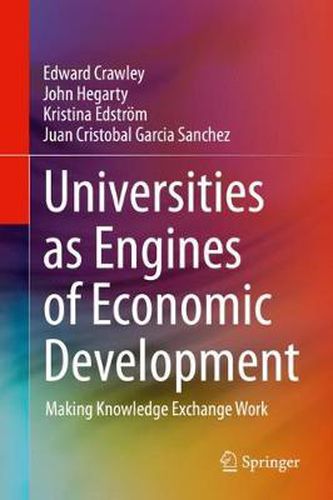Readings Newsletter
Become a Readings Member to make your shopping experience even easier.
Sign in or sign up for free!
You’re not far away from qualifying for FREE standard shipping within Australia
You’ve qualified for FREE standard shipping within Australia
The cart is loading…






This title is printed to order. This book may have been self-published. If so, we cannot guarantee the quality of the content. In the main most books will have gone through the editing process however some may not. We therefore suggest that you be aware of this before ordering this book. If in doubt check either the author or publisher’s details as we are unable to accept any returns unless they are faulty. Please contact us if you have any questions.
This book describes patterns of behavior that collectively allow universities to exchange knowledge more effectively with industry, accelerate innovation and eventually contribute to economic development. These are based on the effective practices of leading and ambitious universities around the world that the authors have benchmarked, and the personal experiences of the authors in a number of international institution building projects, including those of MIT.
The authors provide guidance that is globally applicable, but must be locally adapted. The approach is first to describe the context in which universities act as engines of economic development, and then present a set of effective practices in four domains: education, research, innovation, and supporting practices. Each of these domains has three to six practices, and each practice is presented in a similar template, with an abstract, a rationale and description, key actions and one or two mini-case studies. The practices are summarized by integrative case studies. The book:
Focuses on a globally adaptable set of effective practices, complemented by case studies, that can enhance universities’ contribution to economic development, based on an integrated view of education, research and innovation; Presents effective practices and broader insights that come from real global experience, spelled out in templates and explained by cases; Includes tangible resources for university leaders, policy makers and funders on how to proceed.
$9.00 standard shipping within Australia
FREE standard shipping within Australia for orders over $100.00
Express & International shipping calculated at checkout
This title is printed to order. This book may have been self-published. If so, we cannot guarantee the quality of the content. In the main most books will have gone through the editing process however some may not. We therefore suggest that you be aware of this before ordering this book. If in doubt check either the author or publisher’s details as we are unable to accept any returns unless they are faulty. Please contact us if you have any questions.
This book describes patterns of behavior that collectively allow universities to exchange knowledge more effectively with industry, accelerate innovation and eventually contribute to economic development. These are based on the effective practices of leading and ambitious universities around the world that the authors have benchmarked, and the personal experiences of the authors in a number of international institution building projects, including those of MIT.
The authors provide guidance that is globally applicable, but must be locally adapted. The approach is first to describe the context in which universities act as engines of economic development, and then present a set of effective practices in four domains: education, research, innovation, and supporting practices. Each of these domains has three to six practices, and each practice is presented in a similar template, with an abstract, a rationale and description, key actions and one or two mini-case studies. The practices are summarized by integrative case studies. The book:
Focuses on a globally adaptable set of effective practices, complemented by case studies, that can enhance universities’ contribution to economic development, based on an integrated view of education, research and innovation; Presents effective practices and broader insights that come from real global experience, spelled out in templates and explained by cases; Includes tangible resources for university leaders, policy makers and funders on how to proceed.